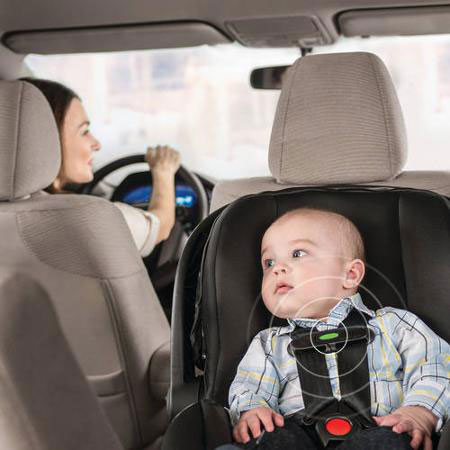Share this
Evenflo infant car seat reminds you that your baby is still in the back seat
On average, 38 children die every year as a result of being trapped in hot cars. In about half the cases, children are forgotten in the back seat, according to the nonprofit KidsAndCars.org. Often, a parent has forgotten to drop a child off at daycare.
Walmart and Evenflo have teamed up to announce a new baby car seat that has built-in technology to alert the driver when the child’s harness clip becomes unbuckled and when the child is still in the seat after arriving at their destination. Last summer it seemed like each week that passed we were hearing about a child who had been left in a car and had died due to heat-related issues. According to an article on CNN.
Distraction and fatigue are just two factors that parents deal with on a daily basis. The Evenflo Advanced Embrace DLX Infant Car Seat with SensorSafe has a special receiver that has been designed to plug into the vehicle’s diagnostic port. This receiver syncs with the harness clip that secures the baby in the car seat. It will alert the driver with a tone when the clip becomes disconnected and when the clip is still connected once the car arrives at the destination and the ignition is turned off. This reminds the parent that the baby is still in the back seat. The connection method doesn’t require a smartphone or use of Bluetooth, making it easier to setup and use for non-technical parents.READ MORE
Source: CNN.
Related Article:
Child Vehicular Heat Stroke Fact Sheet:
Vehicular heat stroke is largely misunderstood by the general public. The majority of parents are misinformed and would like to believe that they could never “forget” their child in a vehicle. The most dangerous mistake a parent or caregiver can make is to think leaving a child alone in a vehicle could never happen to them or their family.
In well over 50% of these cases, the person responsible for the child’s death unknowingly left them in the vehicle. In most situations this happens to the most loving, caring and protective parents. It has happened to a teacher, dentist, social worker, police officer, nurse, clergyman, soldier, and even a rocket scientist.
It can happen to anyone…
The Greenhouse Effect in Vehicles
- The inside of a vehicle heats up VERY quickly! Even with the windows cracked, the temperature inside a car can reach 125 degrees in minutes.
- Cracking the windows does not help slow the heating process OR decrease the maximum temperature
- 80% of the increase in temperature happens in the first 10 minutes
- Children have died from heatstroke in cars in temps as low as 60 degrees.Contributing Factors
- A child’s body overheats 3-5 times faster than an adult body.
- Change in normal daily routine, lack of sleep, stress, fatigue, distractions, hormone changes, worry…symptoms that ALL new parents experience!
- Rear-facing car seats look the same whether there is a baby in it or not.
- Children, especially babies, often fall asleep in their rear-facing child safety seats; becoming quiet,unobtrusive little passengers. Memory (Competing Brain Systems) Prospective Memory: processed by 2 brain structures
1. Hippocampus, stores new information, the ‘here and now’ (processes that a child is in the car) 2. Prefrontal Cortex, enables us to plan future, accounting for a change in routine (processesroute, including to go to daycare rather than straight to work)
Habit memory: forms subconsciously through repeated activities like riding a bike
• Basal Ganglia – stores habit memories (driving to/from work daily), enables auto-pilot
What causes a parent to misremember? The basal ganglia takes over and suppresses the prefrontal cortex. The brain is on auto-pilot, doing what it would do on any given day, not accounting for changes in routine. Memory specialists note that the basal ganglia is much more likely to take over when someone is fatigued.
“Parents lose awareness that their children are in their cars. Tragically, these parents report that they had pictures of their child on their desks, they talked about their child, and even left work on time to pick up their child from daycare.” (Dr. David Diamond, Neuroscientist, University of South Florida)
For more information visit www.KidsAndCars.org or contact us at [email protected].





















